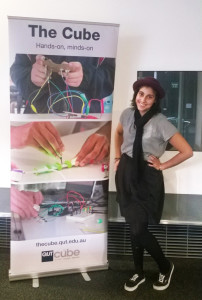Teaching is a career where professional renewal is key, and support is a necessity.
Over the past year, I have found both of these through the Step Up team, and have been given the opportunities to attend the ASTA National Science Teachers Summer School, and to practise my teaching skills through the STEM Studio. This weekend, I was fortunate enough to be sponsored by Step Up to attend Creative Lab 2015: STEM to STEAM, with fellow STEM Studio peers, teaching professionals and a range of other inspiring minds.
Creative Lab is an initiative of the Queensland Museum, in conjunction with The Cube, QUT and kuril dhagun, Queensland State Library. It was an awesome experience!

STEAM is an innovative wave of education, acting to integrate Art into the STEM disciplines (science, technology, engineering and maths). Further, STEAM acts to shift the emphasis of teaching away from content delivery, toward self-directed discovery. As my teaching areas are English and Biology, I found this idea fascinating yet not surprising, and was excited to find out further practical links between the subjects.
Day One was kicked off at the Queensland Museum with a keynote from Professor Angelina Russo, which sparked conversations that even the rainy weather couldn’t dampen. Everyone was excited, however, to get practical in the workshops. These were interactive and offered educators real engagement with practical skills, which linked to curriculum and industry partners! Each attendee has the choice to select two sessions, from a choice of four:
- Science in Motion: Identify shape and rhythm through nature;
- Animated Creatures: Bring your story to life;
- Ingenious Engineers: Blueprint your imagination, and;
- Collection Electronica: The museum of tomorrow.
I must admit that I wanted to attend them all. My favourite of the day, however, was Science In Motion, presented by Vulcana Woman’s Circus. We were pushed outside of our comfort zones to try some circus stunts which quickly built hilarity and trust within the space. Through this we were able to explore body forms and movements, and how these can be used to investigate and communicate patterns or cycles in nature within the classroom.
Topping off this marvellous first day was the invitation to an Immersive Indigenous Dinner, which was both delicious and educative of the Indigenous bush-tucker and native foods in Brisbane, prior to settlement. The excellence of this night was still starting conversations well into Day Two.

Day Two was another hands on day, this time at The Cube, QUT. The workshops on offer this time were:
- Makey Makey: Using digital hardware to design a video games controller;
- LittleBits: Prototyping with electronics;
- Design Engineering: Robots in space, and;
- Cube Jam: Designing digital STEM content.
I couldn’t help but attend the Design Engineering workshop, though I work frequently with the LEGO EV3 robots as part of LEGO Education at The Cube. The workshop was a dynamic mix of learning and play, and I was interested in the different ways that adults and children explore the robotic technology.

The highlight of the day however, was Cube Jam, presented by Matt Ditton of Many Monkeys Development. Matt had us on edge with quick deadlines and design thinking to design digital content for The Cube. It was a challenging workshop which Matt promised would keep us thinking for days after. He wasn’t wrong! Reflecting on the critical and creative deconstruction and re-construction of ideas that the workshop demanded highlights a range of additional ways that questioning and classroom thinking can occur.

The final session of the conference was a relaxing Q&A. Lubi Thomas (QUT), Adam Jefford (Pimpama State Secondary College), Dr. Kim Nichols (UQ) and Terry Deen (Kelvin Grove State College) summed up the importance of STEAM poetically. As teachers, we need to teach empathetically, through critical inquiry which integrates the soft skills which lead to a greater understanding of life.
The conference was an amazing experience, which allowed me to build greater pedagogical understanding. A big thank you to the Step Up team, on behalf of myself, Kirra Gold, and all of the other pre-service teachers who have and will gain valuable support from the initiative.
To stay up to date with the latest news in pre-service teacher education from Step Up, make sure to check out the website or on Twitter
Melissa.
Melissa Blacklock is a pre-service science teacher studying at QUT, and has been part of the STEM Studio pilot and the National Science Teachers Summer School 2015.
